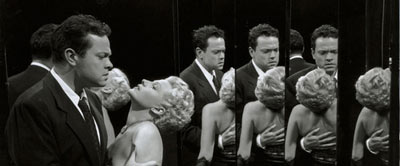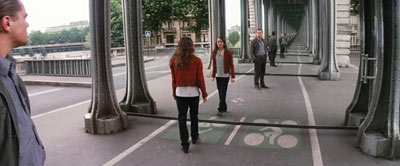The Hall Of Mirrorers
Published on January 30th, 2011 in: All You Need Is Now, Editorial, Issues |The search for originality and creativity seems like an undending, inexorable voyage down a wormhole.

The Lady From Shanghai, 1947
An article in Utne Reader, “The Work Of Art In The Age Of Maniacal Appropriation,” states, “You could certainly argue that the mash-up is—along with zombies and vampires—sort of a perfect zeitgeist metaphor for our cultural present.” The article itself is a short synopsis of a Moby Lives article (“To live outside the law, you must be honest”) by Nathan Ihara as well as the book Reality Hunger by David Shields.
The Ihara piece claims that, “[w]e’ve been living in a world of mash-ups since William Burroughs, Donald Barthelme, David Markson, and . . . The Holy Bible, but it’s the sheer ubiquity of the remix culture that seems remarkable.” He remarks, “[i]n the end, I find this question of honesty the most crucial one when navigating the complexities, both moral and aesthetic, of creating art,” utilizing a Jim Jarmusch quote to sum up the article: “Authenticity is invaluable; originality is non-existent.”
Ihara also refers to the plagiarism scandal surrounding 17-year-old German author Helene Hegemann and her novel Axolotl Roadkill, whose response to the accusations was, “I myself don’t feel it is stealing, because I put all the material into a completely different and unique context and from the outset consistently promoted the fact that none of that is actually by me.” Tellingly and amusingly, the comments on the article devolve into a series of arguments over the genesis of the word “axolotl” itself, complete with the requisite aura of curmudgeonly anti-Internet paranoia.
Yet, Ihara also points to a Daily Beast essay by Ben Greenman, who seems to shrug at the whole notion of plagiarism, saying things like, “[e]verything comes from somewhere” and that “even when there are connections, what of it?”
“The human brain, while complex,” he continues, “is not infinite, and all creativity is a mix of innovation and imitation.” Most importantly, he wants to know, “how have we reached the point where the standard for a thought is chronological primacy?” mentioning the “get-there-first-or-not-at-all world,” one in which Google can be both muse and detective.
In the Utne Reader article with which I started this piece, there’s a link to the website of the publisher for the aforementioned Reality Hunger, where the book is described as, “[a]n open call for new literary and other art forms to match the complexities of the twenty-first century.”
Here’s where I veer slightly off the current path into an article not previously linked, a Pop Matters review of Marcus Boon’s In Praise Of Copying. (The title of the review—”So Fake It’s Beyond Real”—is itself a potential referential twist on the Hole song “Doll Parts”: “I fake it so real I am beyond fake”.) According to writer James Williams, the Marcus Boon book is fascinating, despite that fact that it is also dense and somewhat overwhelming; he admits that ” at other times the sheer volume of things [Boon] finds interesting is overwhelming.”

Inception, 2010
This sort of collective ADHD subconsciousness seems to have infected all of us. Pajiba‘s C. Robert Dimitri recently addressed this “plague” in an article called “Too Many Things: A Reflection on First World Problems.” He laments the overwhelming nature of stimulation, saying at one point, simply but profoundly: “There is too much.”
But what is the affect of all of this? Almost a year ago, I talked about this situation, and opened my own editorial with a reference to a speech given by Duran Duran’s John Taylor, one in which he argued that the Internet is stifling creativity.
Interestingly, Mr. Taylor recently set up not only a Facebook page but also a Twitter feed, one which he updates almost constantly, and not just with his own commentary, but responses to fan questions. It’s an actual interactive space.
We review Duran Duran’s latest album All You Need Is Now in this issue. The title of the album inspired the theme of this issue. Now that Mr. Taylor seems to have embraced (somewhat) the creative influences of the Internet, it’s intriguing to examine the lyrical content of the album, which includes phrases like “interactive nightmare show” (from “Blame The Machines”); and “someone always watching what we do” and “the moment is stolen” (from “Being Followed”). They even have credits for the samples they used in the liner notes.
The album itself has been called a “return” to the sound they established on 1982’s Rio, which is pretty funny considering the title of the album. Much credit for this has been given to producer Mark Ronson, himself a fan of the band and a conduit for a multiplicity of reference points and influences. As a longtime Duran Duran fan, I like the album a lot, but it doesn’t sound like Rio to me. It sounds like Duran Duran sounds now. And that’s fine with me.
Although Popshifter tends to focus quite a bit on what has come before in an attempt to avoid praising disposable pop culture, there are a lot of current things that are truly inspiring and amazing, and we tried to focus on some of those in this issue, even if some of those things were themselves inspired by past creations.
That Pajiba article I mentioned? It actually ends on a hopeful note: “Perhaps the best that you can do is to savor that book, that movie, that album, or that game while you can.” Or to put it more succinctly, and to quote the song “All You Need Is Now”, the best thing to do is “find yourself in the moment.”
I don’t know that I could phrase it any better.
—Less Lee Moore, Managing Editor
Time limit is exhausted. Please reload the CAPTCHA.